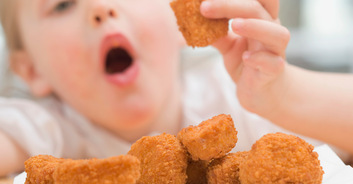With a relationship comes kisses, cuddles and lots (and I mean lots) of meals together. So much so that one in four Americans has failed a diet because their partner led them astray, according to new research.
Sucks to hear that your boo could be stopping you from reaching your goals, but when you think about it, it all adds up. Every takeaway, every date night, every place your best friend couple (who you must best at everything) tell you: "you have to go there!"
A survey examining how and why our attempts to eat healthily and lose weight often fail found that a surprisingly high number of diets come undone because of a partner leading us into temptation. From eating irresistible treats and snacks in front of us to ordering takeout or wanting us to have drinks, responses showed 24 percent of people blame their partner for derailing a diet.
The results emerged from a survey conducted by OnePoll, in conjunction with Isopure, which looked into the dieting successes and failures of 2,000 Americans. With people mindful of their summer bodies, responses showed top reasons people fail diets are lack of time to plan meals, having treats around the holidays, social gatherings, treating themselves and stress around work.
Even though many reasons behind diet failures are legitimate, there are some that appear to be simply based on temptation. Responses showed that 38 percent of survey respondents failed on a diet because they couldn’t resist a delicious treat. I must admit: it is very easy to give in when you have a partner in crime.
Another 32 percent claim that healthy food is simply too expensive and so their bank account causes them to reach for a less than healthy snack. "Going halves mean you're not eating as many bad calories," you guys probably say to yourself. Whilst not entirely wrong, damage can still be done to a health and fitness plan even if you don't have a full meal for one.
On top of this, reaching for a feel-good food seems to be a common way for 42 percent of survey respondents to deal with stress. The survey also deduced the foods couples gorge on that are most responsible for the failure. Pizza tops the list, followed by ice cream, chips and chocolate. Cookies came in at number five followed by cake, burgers, candy and cheese.
Jonathan Thompson, general manager at health brand Isopure says: “A diet plan is only good if you can realistically adhere to it, so it’s key to structure the plan around your specific lifestyle and to build permissive indulgent moments into the plan, like a weekly programmed cheat meal on Saturday night when you know you’ll be around friends and family.”
“Having a diet plan that accounts for your particular social, work and exercise cadence turns a potential diet-derailing moment into a positive and programmed part of your diet that you can actually look forward to and greatly multiplies your chances of staying on plan and achieving your goals.”
Saturday is the day that a diet is most likely to come to a crashing halt for survey participants. After breaking a diet, many admit to feeling disappointed, frustrated, upset, annoyed and angry. Changing your habits and mindset to not feel so guilty or maybe spread out your "treats" is difficult but it yields fantastic results when you do.










